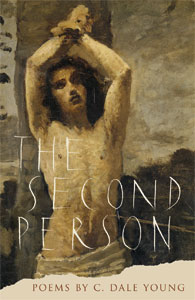
paper • 75 pages • 14.95
ISBN-13: 978-1-884800-76-4
The Architects of Time
had grown to love absence,
and so, the lot had to be vacant
except for the lone tree.
The first, on arrival, would
throw his hands up, reaffirm
that with a gesture he could
return the leaves to the branches.
Another, tired from the journey,
would lie down
and, closing his eyes, hasten
the demise of the locusts.
It was always the same.
A week, a century, the empty lot.
The last architect, the great
philosopher, was late as usual—
when they talked about the end,
he would laugh and remind them
they were now at the mercy
of the scientists, without whom
the architects would cease to exist.
“‘If drinking is bitter, change yourself to wine.’ Again and again, the poems in The Second Person perform just such metamorphoses: from faithlessness, they extract the faithful return of longing; from the stern parameters of bodily affliction, they extract the consoling vista of mortal comprehension. [Young] is no stranger, in other words, to the body in its dying, the spirit in its starkest confrontations, the mind in its intertwining missions of healing and analysis. All of this brings incomparable richness to his poetic project: behold here the luminous form that mindfulness assumes. — Linda Gregerson
If you want poems that delve, if you want language that dissects, if you want emotions that seize and ideas that startle, then The Second Person has you written all over it. — J. D. McClatchy
“The title of Young’s second collection evokes the book’s many concerns: romantic partnership and sex (especially between two men), the nature of the other, and the ‘you’ to whom many of these poems are addressed. Young’s preoccupation with the body comes from his medical background (he is a practicing physician) filtered through an aesthete’s attention to form and lyric (most of these poems are in neat tercets). Young’s speakers are caught between the desire to understand and the desire to simply desire: ‘It is not the bone below the skin that I kiss/ but the silence clinging to the skull’s curve.’ The poems come to the page already burdened by a doctor’s knowledge that mortality rules over even love, and the natural world becomes an analogy for human suffering: ‘the rain spreads like a bruise over the ocean.’ The excellent long poem ‘Triptych at the Edge of Sight’ sketches a blurry romantic ‘landscape filled with failure’ whose all-too-human inhabitants may or may not find spiritual consolation. When Young’s two worlds—the medical and the metaphorical—merge, they create a love poetry that is sublime because and in spite of its knowledge. (Apr.) — Publishers Weekly Starred Review Copyright © Reed Business Information, a division of Reed Elsevier Inc. All rights reserved.